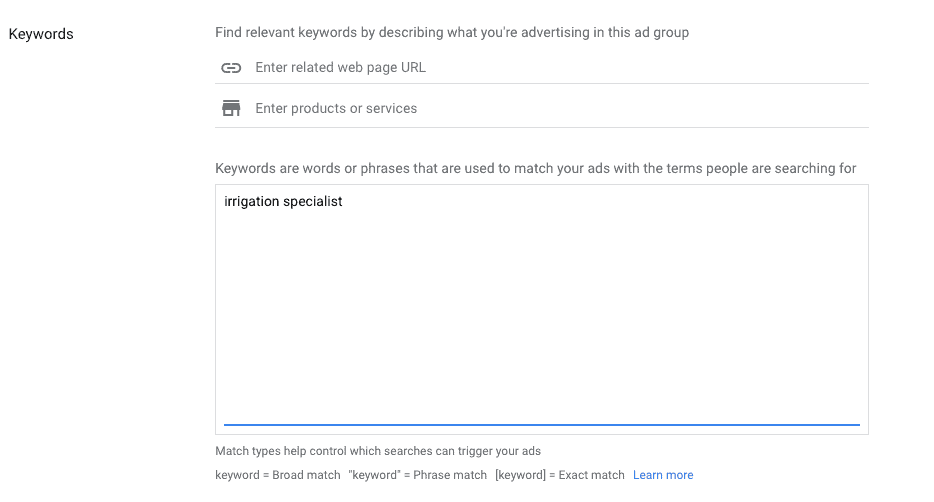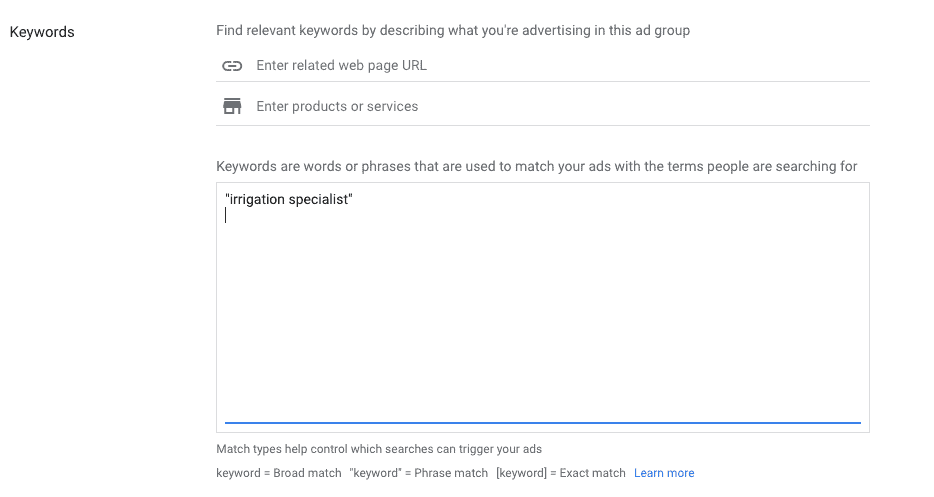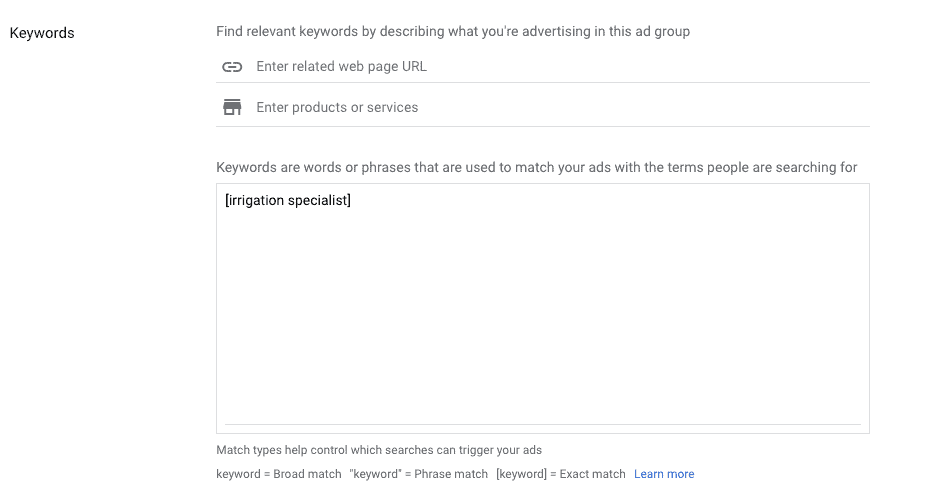Google Ads Keyword Match Types [2025]
Have you ever searched for something on Google only to have it turn up an ad that didn’t use the same phrasing, but got you the end result you were looking for?
Or maybe you’ve seen searches where the ad results somehow completely miss the mark.
Both situations can be attributed to different keyword match types through Google Ads. This happens when Google interprets your search and tries to pair it with ads that are targeting somewhat similar keywords, and while normally Google is pretty right on the money, there’s no guarantee.
As an advertiser, of course, you want to minimize irrelevant ad placements for a number of reasons. They can decrease quality score, lower the chance that someone converts on your ad, and potentially waste ad spend if they do since they’re unlikely to convert.
Having a keyword match type strategy for your Google Ads campaigns, therefore, is imperative. And in this post, we’re going to take a look at everything you need to know about Google Ads keyword match types in 2025, including what the different match types are, how they work, and when you should use each.
Watch our YouTube Video on Match Types here:
What Are Keyword Match Types
Keyword match types tell Google how closely you want them to stick to your list of keywords. Some match types allow you to show up in search results where the user either used synonyms, close meanings, or keywords out of order. Others only want to show up searches that precisely match the keyword.
Why Do Keyword Match Types Matter?
Keyword match types can absolutely impact your campaigns. It can be the difference between telling a hair stylist “Eh, I’m flexible, show me the style you think would look best as long as it’s shoulder-length with bangs” and “I want this exact picture and no more than an inch above my shoulders; I brought a ruler.”
There are three different keyword match types, and they will directly impact which searches your ad appears in. It can impact ad relevance, reach, and (of course) your end results.
It’s important, therefore, to be strategic and intentional when setting keyword match types.
If you say “Christmas LED lights,” do you want to show up in searches for “Christmas lights,” “outdoor lights for Christmas,” or only “Christmas LED lights” instead? It’s possible that if you only sell LED lights and most users looking for “outdoor Christmas lights” only want lower-cost options that you’re going to show up in a lot of irrelevant searches, lowering your CTR as a result.

It’s a small change in phrase, but it could make the difference between capturing a sale or losing it.
You can use keyword match types to broaden your reach or to get more specific about the search terms your ads may place for. All keyword match types can have a place in an advertiser’s strategy, but it’s crucial to understand how to use them.
The Three Google Ads Keyword Match Types Explained
As we’ve already mentioned, there are three keyword match types: Broad match keywords, phrase match keywords, and exact match keywords.
Let’s take a look at each, in descending order of least precise to most precise.
Broad Match
Broad match keywords are going to give Google the most flexibility over which search terms your ad can place for.
When using broad match keywords, your ads could show up in searches that relate to your keyword.
If your keyword is “irrigation specialist,” your ad might show up in searches like the following:
- Lawn care specialist
- Sprinkler installation
- Irrigation system repair
- Water valve replacement
- Agriculture irrigation inspection
- Commercial irrigation management
Some of these terms might align with your services; some may not. They do not have to include your keyword directly at all. It may take the user’s search activities, the content of your landing page, or multiple keywords in the ad group into consideration.
They’re also the default keyword match type. The formatting is to simply enter in the keyword into the ad group without any punctuation, except for a comma to separate it from the next.

The Pros & Cons of Broad Match Keywords
This is the most loose definition of a keyword match type, and it has very distinct pros and cons.
Broad match keywords can expand your reach significantly. You may show up in searches using keywords you may not have found otherwise, and get conversions because of it.
There’s also a high risk, however, that you end up in a significant number of searches that aren’t a fit.
Let’s go back to that irrigation specialist keyword example. If you only do irrigation installation for new developments, you’re not going to want to get a call from a single homeowner to repair a few valves, or to get leads from local golf courses for ongoing maintenance. You might get clicks and leads that aren’t relevant.
Or maybe you only offer irrigation system repairs to homeowners. It wouldn’t do you much good to have commercial agents calling you for installs. It goes both ways.

Negative keywords, therefore, are imperative to increasing the odds that you show up in the right searches (and decreasing the odds that you don’t show up in the wrong ones).
When to Use Them
You’re going to want to avoid broad phrase match when you first get started and if you’re on a tight budget.
If you do have a high budget and either an agency or a highly experienced internal employee managing your account, you can use broad match keywords right away, but be extremely cautious about the search terms that it generates.
Be proactive about adding negative keywords to those campaigns to make sure that you’re not wasting ad spend.
If you have more room in your budget, this match type can generate an enormous amount of volume, so it’s worth testing.
Phrase Match
Next up we’ve got the phrase match keyword!
This is the balance between broad match and exact match keywords, and it’s a good middle ground for some clients.
Phrase match keywords allow your ad to show up in searches that include the meaning of your keyword. Think synonyms and like-meanings. The meaning of the keyword can be implied, which means that users don’t have to enter in the exact keywords in a militant fashion to see your ad.
Let’s go back to irrigation specialist as the keyword. With phrase match keywords, you may show up in the following searches:
- Irrigation repair specialist
- Irrigation expert
- Residential irrigation expert
Phrase match keywords can are formatted with quotation marks around them when entering them into your ad group. So they’ll look like this:
“Keyword”

The Pros & Cons of Phrase Match Keywords
Like all keyword match types, this one has its own pros and cons.
As we mentioned above, it can be a good middle ground between the two more extreme match types. It’s more flexible than exact match, giving you a wider reach, but it’s more specific than broad match so you can have a little more control.
It’s worth pointing out that more diverse placements from phrase match can mean that you’re paying slightly less per-click than you would with exact match. And yet that field of keywords isn’t so diverse that the clicks and impressions you’re getting are unlikely to convert.
It’s a solid mid-range click that’s relatively high-intent and relevant.
There is, however, room for ad irrelevance, so you’re still going to want to leverage negative keywords.
When to Use Them
Phrase match keywords are a good place to start for brands that have mid-level to high budgets, because they give you some room to play and learn while gathering data but not to the point that they’ll squander your ad spend too quickly.
They give you more control and increase the results that you’ll get right off the bat as long as your keyword research was on point.
Exact Match
Last up, we’ve got exact match keywords.
These are pretty much what they sound like: They’ll only allow your ads to show up in searches that have the exact same meaning or intent as the keyword.
The following will show up for the “irrigation specialist” keyword:
- Irrigation specialists
- Irrigation specialist
- Specialist in irrigation
- Irrigation specialist near me
Exact match requires brackets around the keywords. It will look like this:
[keyword]

The Pros & Cons of Broad Exact Match Keywords
Exact match keywords give you the maximum amount of control over what searches your ads can place for. Sometimes that control can be beneficial.
In some cases, it may be limiting.
These keywords are extremely targeted, so it can make it easier for you to see which are working and which are not. If your keyword research was correct, you also have a higher chance of converting users with exact match keywords. It may also deliver higher quality leads.
The downsides are worth considering, too. You’re going to see a decrease in the total number of placements you qualify for. Fewer placement opportunities, after all, means fewer placements period.
You may also end up paying more per click, which can lead to higher cost leads and clicks. Since this also may mean higher quality leads, that’s not automatically a bad thing, but it’s worth paying attention to.
When to Use Them
We recommend that our clients start with exact match keywords in many cases right off the bat. It allows you to gain traction and give Google specific directions while you (and Google) amass data. That can be helpful immediately and when you want to scale up by expanding to other keywords long-term.
If you’re on a particularly tight budget— stick to exact match keywords until you’ve generated some solid data and feel more comfortable expanding your reach on high-performing keywords. You can open them up to phrase match and/or broad match keyword match types as you feel more comfortable doing so.
How to Set Keyword Match Types in Google Ads
When you’re setting up your campaigns, there are two different ways to add match types to your keywords.
When you’re planning your campaigns in the Google Keyword Planner during keyword research, you’ll see the option to set the keyword match type when you add phrases to ad groups. Broad match is the default (as per usual), but you can change that.

And when you’re creating individual campaigns and ad groups, you can use formatting to specify different match types of each individual keywords. If you ever forget the formatting, the good news is that Google has it right below the keyword field.

Keep in mind that you can edit your match types (and the keywords themselves) at any point in time. To do this, you can view and edit individual ad groups, and then edit the individual keywords and their match types.

4 Different Keyword Match Strategies to Test
We’ve provided basic guidance for our go-to method for keyword match strategies above.
The gist as a quick recap: Start with exact match and work your way up, testing more flexible options as you see and assess results.
There are other keyword match strategies that you can employ as you get your account up and running, however. Let’s look at each of those.
Using Broad Match to Find High Intent Search Terms
Sometimes it can completely take us by surprise what keywords end up doing well for our campaigns.
That’s where broad match keywords shine. They can help us discover new keywords and achieve placements we never would have thought of, even after extensive keyword research.
This is true for both text and shopping ads.
You can identify new winning terms, and if you want to target them more specifically, you can add them to your ad group as a phrase match or exact match keyword.
Combining Broad Match with Specific Audience Targeting
Some advertisers choose to take advantage of broad match keywords while leveraging other types of audience targeting to increase the relevance of their placements overall but still maintaining keyword flexibility.
You can add qualities like demographics, interest, hobbies, and online behaviors to help more effectively target audience segments that you most want to reach.

Using Broad Match With Smart Bidding
The power of smart bidding with broad match keywords can at times feel like a cheat code if it works.
If your campaign or account has enough conversion data to properly use smart bidding then adding broad match keywords to your already performing campaigns and ad groups will hit the accelerator on them for continued expansion.
Bid More On Exact Match Keywords
Want to get the most out of those high-value keywords that you know are money makers?
Don’t be afraid to bid more on them.
The reality is that you’re probably going to be paying more for exact match keywords anyways. Some brands prefer to intentionally bid even more here, though, knowing that the lead quality will be higher.
They’ll then rely on lower-cost broad match keywords to expand reach at a lower CPC overtime while still maintaining strong results.
Final Thoughts
Keyword match types are just one part of the equation that you need to take into consideration, but they’re an important one. Combined with a strong keyword strategy and a solid use of negative keywords, you’ll be well on your way to getting relevant ad placements and real momentum. Our expert Google Ads agency can help you get set up with both.
Learn more about how to execute Google Search Ad Fundamentals here. And if you need help managing and optimizing your campaigns, learn more about how we can help you by getting in touch



 How to Conduct Keyword Research
How to Conduct Keyword Research
